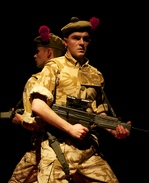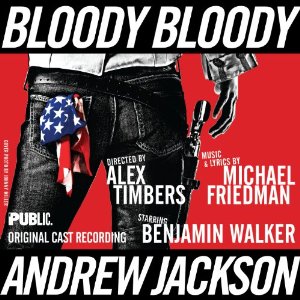SITE GUIDE
SEARCH
REVIEWS
REVIEW ARCHIVES
ADVERTISING AT CURTAINUP
FEATURES
NEWS
Etcetera and
Short Term Listings
LISTINGS
Broadway
Off-Broadway
NYC Restaurants
BOOKS and CDs
OTHER PLACES
Berkshires
London
California
New Jersey
DC
Connecticut
Philadelphia
Elsewhere
QUOTES
TKTS
PLAYWRIGHTS' ALBUMS
LETTERS TO EDITOR
FILM
LINKS
MISCELLANEOUS
Free Updates
Masthead
A CurtainUp Review
Black Watch
|
It's a fockin' job, ain it? —a Black Watch soldier's rhetorical question while serving in Iraq.
|

Scott Fletcher as Kenzie and Jamie Quinn as Fraz in the National Theatre of Scotlandís production of Black Watch.
(Photo by Manuel Harlan) |
The name refers to the Scottish Military Regiment with a long and distinguished history as well as the dark navy and green tartan kilts worn by its soldiers. Founded in 1661, the infantry battalion has fought and distinguished itself in Mesopotamia, Africa, Asia, Europe, Northern Ireland, and Iraq. Past members include T. E. Lawrence, and Ian Fleming, creator of James Bond.
Black Watch stands for tradition and the pride its members have in being part of the "golden thread," belonging to the regiment their grandfathers, uncles had been part of. (In the program bios, actors make note of their personal associations with Black Watch, too.) It's also a job — a point that is well made as characters discuss why they joined. Job opportunities for sixteen, seventeen and eighteen year olds in a remote part of Scotland are very few indeed. "It's either the shipyards or the mines," says one. Neither offers the kind of "buzz" these bored and idle young boys crave (apart from sex.)
If those words sound authentic, it is because they are taken verbatim from talks Black Watch soldiers had with Gregory Burke, a journalist who sought the truth about serving in Iraq. What Burke got from them he turned into the play Black Watch, that has been staged so brilliantly by director John Tiffany, associate director for movement Steven Hoggett and associate director for music, Davey Anderson. While the subject is very dark and the Scottish brogues sometimes hard to fathom, meaning is never lost. Plus there are moments of humor and music hall. (I was reminded of the musical about World War I, Oh, What a Lovely War.)
What's not in the words — and they are very powerful — is in the music which includes a bagpipe player, and such movement as marching on parade, gestures, synchronization, slo-mo, falling from the sky. Laura Hopkins's set is spare but specific, there's no getting lost. Colin Grenfell's lighting is dramatic; props such as a pool table morphs in one's mind from its place in a pub to a truck carrying troops into battle.
Much of the 110 minutes is devoted to the harrowing truth of what happened when Black Watch, ill prepared by the Americans for what they were about to face, stepped in for the Yanks near Fallujah, an area known as the Triangle of Death. "We'll have to make it up as we go along," says the Black Watch Officer, who also tells his boys that they are "out here fighting for porn (meaning freedom of speech) and petrol." Is it any wonder that Cammy, the soldier most likely to make a career in the army< declares that he'll have none of it, that he would rather go home to Scotland, to boredom, and "a job behind the dairy counter" at the local supermarket.
At the performance I attended, the part of Cammy was played by understudy Paul Tinto, a last minute substitute for Jack Lowden who became ill just as the performance was about to begin. The audience was unaware of the change until after the show. Nor was the substitution evident as the cast, including Tinto, is finely integrated into a whole, just like a regiment on parade. Black Watch is still ensemble acting and dramatic storytelling at its very best.
Editor's Note: Curtainup' missed the St. Ann's Warehouse runs of the show, but you can read the double review by our London critics
|
Black Watch, by Gregory Burke John Tiffany, Director Steven Hoggett, Associate Director (Movement) Davey Anderson, Associate Director (Music) Laura Hopkins, Set Design Colin Grenfell, Lighting Design Gareth Fry, Sound Design Jessica Brettle, Costume Design Leo Warner and Mark Grimmer, Video Design Cast: Jack Lowden (Cammy)*; Richard Rankin (Granty); Ross Anderson (Rossco); Chris Starkie (Stewarty); Cameron Barnes (Macca); Stuart Martin (Nabsy); Paul Higgins (Writer and Sergeant); Jamie Quinn (Fraz); Scott Fletcher (Kenzie); Ian Pirie (Officer and Lord Elgin.) Understudies: Adam McNamara and Paul Tinto who took the part of Cammy at the January 28, 2011 performance. Running time: 110 minutes, no intermission. January 26 - February 6, 2011, at Shakespeare Theatre Company's Harman Hall, 610 F St., NW; Washington, DC; 202-547-1122; ShakespeareTheatre.org Review by Susan Davidson based on Friday, January 28, 2011 performance. REVIEW FEEDBACK Highlight one of the responses below and click "copy" or"CTRL+C"
Paste the highlighted text into the subject line (CTRL+ V): Feel free to add detailed comments in the body of the email. . .also the names and emails of any friends to whom you'd like us to forward a copy of this review. Visit Curtainup's Blog Annex For a feed to reviews and features as they are posted add http://curtainupnewlinks.blogspot.com to your reader Curtainup at Facebook . . . Curtainup at Twitter Subscribe to our FREE email updates: E-mail: esommer@curtainup.comesommer@curtainup.com put SUBSCRIBE CURTAINUP EMAIL UPDATE in the subject line and your full name and email address in the body of the message Click on the address link E-mail: esommer@curtainup.com Paste the highlighted text into the subject line (CTRL+ V): Feel free to add detailed comments in the body of the email. . .also the names and emails of any friends to whom you'd like us to forward a copy of this review. Visit Curtainup's Blog Annex For a feed to reviews and features as they are posted add http://curtainupnewlinks.blogspot.com to your reader Curtainup at Facebook . . . Curtainup at Twitter Subscribe to our FREE email updates: E-mail: esommer@curtainup.comesommer@curtainup.com put SUBSCRIBE CURTAINUP EMAIL UPDATE in the subject line and your full name and email address in the body of the message |




